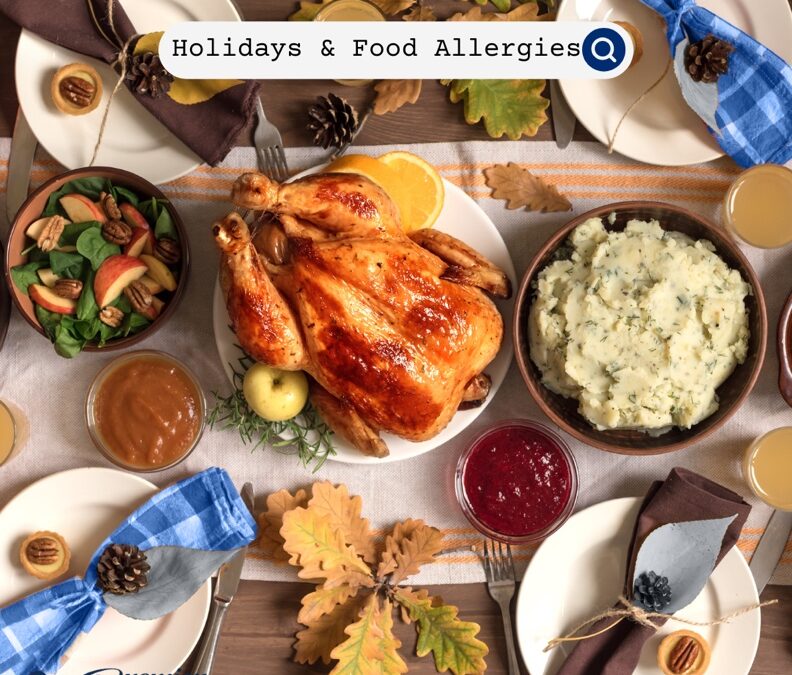The holiday season is a time for celebration, gathering with loved ones, and of course, enjoying delicious meals and treats. However, for those living with food allergies, the holidays can be stressful. With an abundance of food-centric gatherings, potlucks, and shared meals, navigating the season safely can feel overwhelming.
At Premier, we know how challenging it can be to balance the joy of the holidays with the need to stay vigilant about food safety. But with proper planning and communication, you can enjoy the holiday season while keeping food allergies under control. In this blog, we’ll explore key tips for managing food allergies during the holidays, so you can enjoy every moment without unnecessary stress.
1. Know Your Triggers and Communicate Early
The first and most crucial step in managing food allergies during the holidays is knowing your specific triggers. Whether you or a loved one are allergic to nuts, dairy, gluten, shellfish, or other allergens, it’s essential to be clear on what foods to avoid.
Once you know your triggers, communicate with hosts early. If you’re attending a holiday gathering at someone else’s home, talk to the host ahead of time. Let them know about the specific allergens you need to avoid and don’t hesitate to offer suggestions for safe alternatives. Many hosts appreciate the heads-up, as it allows them to plan meals that accommodate everyone.
If you’re hosting, make sure you communicate your food allergy needs to your guests and label dishes clearly to avoid any confusion.
Key Tips:
-
Contact the host ahead of time to discuss food options and ingredients.
-
Ask for ingredient lists or suggest safe alternatives.
-
Offer to bring a dish that is safe for you or your family member to eat.
2. Bring Your Own Allergy-Friendly Dishes
One of the easiest ways to ensure that you’ll have something safe to eat at a holiday gathering is to bring your own allergy-friendly dishes. Whether it’s a main course, side dish, or dessert, having at least one dish that you know is safe will give you peace of mind. You can enjoy the holiday meal without worrying about accidental exposure to allergens.
Not only does bringing your own food reduce the risk of cross-contamination, but it also allows you to share delicious, allergen-safe recipes with others. Many allergy-friendly dishes are just as tasty as traditional holiday fare, and you might even inspire others to try something new.
Key Tips:
-
Prepare allergy-friendly versions of popular holiday dishes, such as gluten-free stuffing or dairy-free mashed potatoes.
-
Bring an allergen-free dessert so you don’t miss out on sweet treats.
-
Use separate serving utensils to avoid cross-contamination.
3. Educate Others About Food Allergies
While food allergies are becoming more common, not everyone is fully aware of how serious they can be. During the holiday season, take the opportunity to educate friends and family about food allergies and the importance of staying vigilant.
Explain the difference between food intolerances and life-threatening allergic reactions, and let them know the steps they can take to help you stay safe. For example, cross-contamination can happen when a serving spoon used for an allergen-containing dish is also used for an allergen-free dish. Make sure your hosts understand the importance of keeping foods separate and avoiding shared utensils.
It’s also a good idea to have a conversation with close family members about how to recognize the signs of an allergic reaction and what to do in case of an emergency.
Key Tips:
-
Share information about the severity of your food allergy and why even trace amounts of an allergen can be dangerous.
-
Help your hosts understand how to avoid cross-contamination in the kitchen.
-
Show loved ones how to use your emergency medication, such as an epinephrine auto-injector, if necessary.
4. Plan Ahead When Traveling
If your holiday celebrations involve travel, planning ahead is essential to avoid food allergy challenges on the road. Whether you’re traveling by car, plane, or train, you’ll want to make sure you have access to safe food options throughout your trip.
When flying, research airlines to see if they offer allergy-friendly meals or accommodations. Some airlines are more accommodating than others, and you may want to bring your own snacks to ensure you have safe options during the flight.
If you’re staying with family or friends, let them know about your food allergy needs in advance. It may be helpful to bring some allergy-friendly snacks and ingredients with you, so you can prepare your own meals if needed.
Key Tips:
-
Pack allergy-friendly snacks for the trip, like granola bars, fruit, or pre-packaged meals.
-
Research restaurants and grocery stores near your destination to find allergy-friendly options.
-
Bring extra medication, including an epinephrine auto-injector, in case of an emergency.
5. Have an Action Plan for Emergencies
Even with careful planning and communication, accidents can happen. That’s why it’s important to have an emergency action plan in place in case of an allergic reaction.
Make sure you always carry your medication with you, including antihistamines and an epinephrine auto-injector, if prescribed. Let those around you know where your medication is and how to administer it in case of an emergency. If you experience symptoms of a severe allergic reaction, such as difficulty breathing, swelling, or hives, seek medical attention immediately.
It’s also a good idea to wear a medical alert bracelet or carry a card in your wallet that lists your allergies and emergency contacts.
Key Tips:
-
Always carry your epinephrine auto-injector and antihistamines with you.
-
Have a plan for what to do in case of an allergic reaction, and share it with family and friends.
-
Don’t hesitate to seek medical help if you experience symptoms of an allergic reaction.
6. Create New Holiday Traditions
If traditional holiday meals are difficult to navigate due to food allergies, consider creating new, allergen-friendly traditions that everyone can enjoy. This could be as simple as hosting a potluck where each dish is free from common allergens, or organizing a holiday cookie decorating party with gluten-free, dairy-free, or nut-free options.
The holidays are about spending time with loved ones, and food doesn’t have to be the centerpiece. You can also focus on other activities, like playing games, watching holiday movies, or going for a walk to enjoy the festive lights.
Key Tips:
-
Start a new tradition of cooking allergy-friendly meals together as a family.
-
Focus on non-food activities to celebrate the season.
-
Encourage loved ones to try allergy-safe recipes—they might discover new favorites!
The holiday season should be a time of joy, connection, and celebration. If you or a family member has food allergies, it doesn’t mean you have to miss out on the fun. By communicating early, planning ahead, and taking the necessary precautions, you can safely enjoy the holidays without the worry of allergic reactions.
Happy holidays, and stay safe! 





